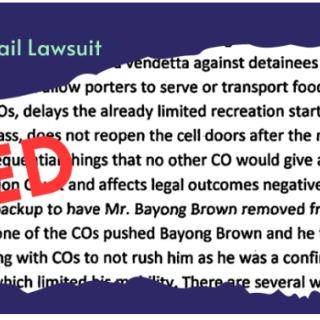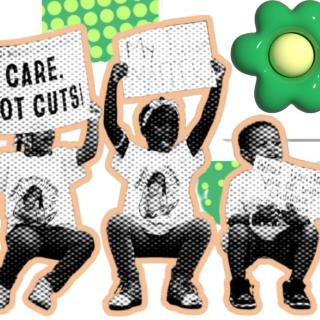Leaders of #ReuniteUS, a campaign to raise the visibility of people who were deported after living in the United States for decades, want to be seen, heard, and included in the immigration debate. Today fifty-seven people who were deported, from thirty-three states, sent a letter to the Biden administration calling for a chance to come home. They were joined in this people’s petition by 101 loved ones and 90 allies.
Also today, the family of Goura Ndiaye sent a heartbreaking letter to the Biden administration calling for his return. Ndiaye is represented by the National Immigrant Justice Center on his application for humanitarian parole, which is pending before the U.S. Department of Homeland Security. And Boubou Koita, a father from New York City, offered this video message about his deportation to Mali during the Trump administration.
The people’s petition was sparked by President Biden’s plan to assist some undocumented spouses of U.S. citizens — but not them. The group finds hope in a congressional resolution introduced by Senator Booker and Representatives Cleaver, Espaillat, and Trone. The resolution calls on the Biden administration to implement “A Chance to Come Home,” a policy proposal crafted by the National Immigrant Justice Center.
The full text of the people’s petition appears below. The letter and signatories can also be accessed here.
We are a group of people who lived in the U.S. for decades, working and taking care of our families. Many of us have U.S. citizen relatives — spouses and children, nieces and nephews. We are beloved members of our communities. The Trump administration deported us from Alabama, Arizona, California, Colorado, Florida, Georgia, Illinois, Indiana, Kentucky, Louisiana, Maryland, Michigan, Minnesota, Mississippi, Missouri, Nebraska, New Jersey, New York, North Carolina, Ohio, Oklahoma, Oregon, South Carolina, Tennessee, Texas, Virginia, Washington, DC, and Wisconsin to places we hadn’t seen for years — Albania, Cameroon, Costa Rica, El Salvador, Egypt, The Gambia, Guatemala, Guinea, Honduras, Ivory Coast, Jordan, Korea, Mali, Mauritania, Mexico, Morocco, Peru, the Philippines, Senegal, Sierra Leone, Tunisia, and Zimbabwe.
When President Biden took office, we hoped things would change for us and our families. We prayed we could come home. But now, near the end of President Biden’s first term in office, we are still separated from our loved ones. We went from taking care of our friends and families to a new reality — one that doesn’t feel real, to be honest. Every day is a struggle, for us and for them. Our families and communities need us. We want to come home.
We have a simple question for President Biden and the next administration. Are they going to let the Trump administration’s action be our last experience in the United States? Are they going to let this mistake – and we do believe it was a mistake, that we were deported – last for the rest of our lives?
We know that Americans have good hearts. We felt safe there. We are proud of our work there and the things we did to help our communities. All we want is to come back to the place where we feel at home. We are calling on the Biden administration to let us come home.
The Trump administration increased deportations to Africa by 74%, focusing on long-term residents, including those with U.S. citizen relatives. They had benefited from prosecutorial discretion under previous administrations, but the Trump administration chose to deport them. Many people involved in the Ohio Immigrant Alliance’s #ReuniteUS campaign, which seeks to expand paths to return for people who were deported, were working legally in the United States, owned homes, and had U.S. citizen spouses and children at the time of their deportation. They want a chance to come home, too.
Goura Ndiaye was deported from Columbus to Mauritania in 2019, forced to leave behind a family that includes two young sons who are U.S. citizens, one of whom has Down Syndrome. In a video for the National Immigrant Justice Center Goura said, “I think deportation like this is a mistake…. They should give people second chances. That’s what I believe…. And I do love America. Whatever happened to me, I’m not gonna say any wrong things to any American people. No. I had a lot of friends. A lot of good neighbors. Never had problems with anybody. I couldn’t believe they were going to deport me. It’s not easy to be in a country for almost twenty years and build your life and one day, it stops. It’s a long way to get experience in another country. To learn English. To go to school at nighttime. To learn. Go to work. Get the experience. And then one day they say stop. You don’t have it any more, you have to leave. The day [ICE] told me that — it was the end of the world for me.” Read more about his experience in “Broken Hope: Deportation and the Road Home.”
Mustapha Komeh was deported from Columbus to Sierra Leone, also during the Trump administration. He wrote in a WhatsApp message, “I am from Columbus Ohio my family is still there I have 15 yrs old boy and 11yrs old girl only my little girl my daughter we talking nw my son is so mad at the whole situation is not talking to me much or her mum all am saying is that my family needs me has much i need them, am not asking the u.s government to return me back but is my right to be with my kids helping them with everything i can i didn't do anything wrong, I wanna see my family.”
The Trump administration deported Demba Jobe to The Gambia from Wisconsin. His wife, Georgina, is a U.S. citizen. “I’m still in love with my wife. I love my family. I wish to come back and stay with them, and continue the life I was doing with my wife because she needs me. I need her,” he said.
Wrote Georgina,“When I met [my husband], I knew he was my soulmate and now I have been stripped of my husband as well as time with him, and he has been gone for most of our marriage. Help my family get back together, please.” Read more about their experience in “Broken Hope: Deportation and the Road Home” and hear directly from Demba here.
The experiences of people who were deported — despite being married to U.S. citizens — were highlighted during the 2020 Democratic National Convention. Then eleven year‑old Estela Juarez’s video letter to President Trump, which aired on the main stage, was called the “most gutting part”of the Convention’s third night. “My dad thought you [Trump] would protect military families, so he voted for you in 2016, Mr. President. He says he won’t vote for you again after what you did to our family. Instead of protecting us, you tore our world apart.”
Outside of the convention, U.S. citizen Maria Paz Perez called on then-candidate Biden to bring her husband, Brigido, home. “Living like this is physically, emotionally, and financially draining. And it doesn’t have to be this way. There are ways that my husband could return to the U.S. and be with us, if our leaders had the political will to allow it. I want to know if candidate Biden sees my family’s separation too and, if elected, whether he will use his power to bring my husband home,” she said.
Responding to years of leadership from U.S. military veterans, the Biden administration created a centralized program for veterans who were deported to request being allowed to return. “Regardless of where we’re born, we all feel like [our country of deportation] is not our home. This is not our country. Our ties [to the U.S.] are so strong. And our commitment to our country is stronger than where you were born,” said Joaquin “Jack” Aviles, co-director of the Deported Veterans Support House in Tijuana, Mexico.
The veterans policy received the strongest support among all pro-immigrant actions taken by Biden in a poll by the Immigration Hub. Other people who were deported but also built good lives here, and have family members and friends who feel their absence every day, deserve the same opportunity.
In June, the loved ones of people who were deported took to Capitol Hill to share their families’ experiences, chronicled in Broken Hope: Deportation and the Road Home. This book, written by Lynn Tramonte of OHIA and Suma Setty with the Center for Law and Social Policy, is based on 255 interviews OHIA organizer Maryam Sy conducted with people who were deported to numerous countries, primarily in Africa.
Said another member of the #ReuniteUS community, Momodou Jobe, “Our hopes are broken by deportation. It needs patience and determination but we will get back to the U.S., God willing. They have deported our physical bodies but our spirits are still there with our loved ones.”
Read more about the experiences of people who were deported in Broke Hope: Deportation and the Road Home, a book based on 255 interviews conducted by OHIA organizer Maryam Sy. Listen to audio summaries and watch video testimonies from people who were deported, and their loved ones, here.
Hear from fathers whose children have been harmed due to their deportation here and donate to help Ibrahima Keita’s sons travel to visit him following his deportation here. To learn more about how deportation has harmed children, check out this factsheet from the Children Thrive Action Network.
Read the people's petition and letter from the family of Goura Ndiaye.
Watch this video message from Boubou Koita, who was deported from New York to Mali.
-------------------------------------------------------------------------
The Ohio Immigrant Alliance works with immigrants, allies, and pro-immigrant leaders and organizations to expand our voices and our power. Find us on X, Facebook, and Instagram



